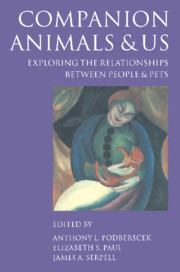Book contents
1 - Introduction
Summary
To me you are still nothing more than a little boy who is just like a hundred thousand other little boys. And I have no need of you. And you, on your part, have no need of me. To you, I am nothing more than a fox like a hundred thousand other foxes. But if you tame me, then we shall need each other. To me, you will be unique in all the world. To you, I shall be unique in all the world …
(The Little Prince by Antoine de Saint-Exupéry, 1945: 64).Not so long ago, the idea of studying social relationships between humans and other animals would have been regarded as tantamount to heresy. In Europe, until the early modern period, animals were viewed as irrational beings placed on earth solely for the economic benefit of mankind, and most scholars would have insisted that affectionate relationships between people and animals were not only distasteful but depraved. Happily, those days are now gone. Attitudes to animals have changed, and, during the past three decades, the subject of relations between people and other animals has become a respectable area of research. The field of ‘anthrozoology’, as it is often called, now crosses a wide variety of academic disciplines, including anthropology, art and literature, education, ethology, history, psychology, sociology, philosophy, and human and veterinary medicine. In 1991, the International Society for Anthrozoology (ISAZ) was formed in Cambridge, England, its stated aim being to promote the study of all aspects of human–animal relationships by encouraging and publishing research, holding meetings, and disseminating information. To facilitate this process, there are now two academic journals dedicated to publishing original research in the field: Anthrozoös (published since 1987), and Society & Animals (published since 1993). In addition, ISAZ publishes a biennial Newsletter containing review articles and book reviews.
But why study relationships between people and animals in the first place? What purpose does it serve? The key to answering these questions lies in the unique ability of anthrozoology to create theoretical and conceptual bridges that not only link together widely separated disciplines but also span the gulf between the world of humans and the life of the rest of the planet.
- Type
- Chapter
- Information
- Companion Animals and UsExploring the relationships between people and pets, pp. 1 - 4Publisher: Cambridge University PressPrint publication year: 2000



